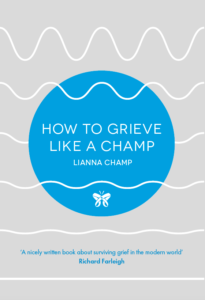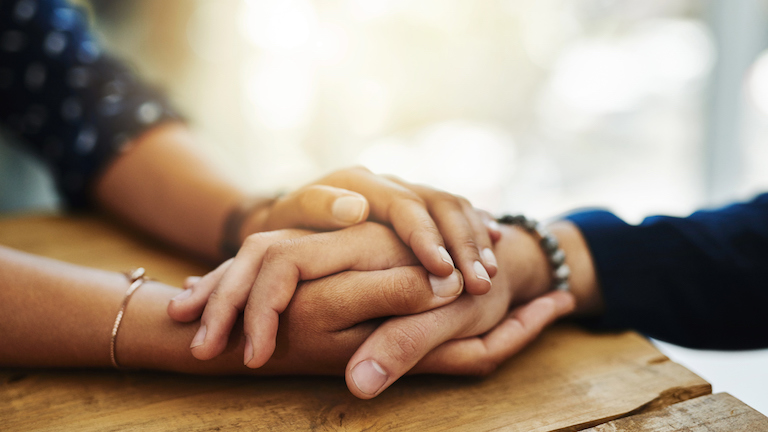How to cope with grief isn’t exactly an easy conversation starter. But if someone close to you dies, the terror and loss can be overwhelming. That’s why we asked Lianna Champ, grief recovery specialist and author of new book How to Grieve Like a Champ to share her insights – with an intro from editor Anna Magee
Anna Magee, Healthista editor here. I was in two minds about running a piece about grief. Healthista is after all about how health can be fun, about body and mind positivity and how wellbeing can be transforming for the soul.
But four weeks ago, my mother died.
She was the most radiant, beautiful woman who could light up a room with her smile – not because she was my mum, but because everyone always said so.
She was only 67 and had battled metastatic cancer for six months before passing away peacefully on June 25th.
I was so, so close to her and I’d always thought I couldn’t live without her. Like, literally could. not. live. I couldn’t even entertain the idea that one day she would die.
And yet, here I am. I don’t know how I am doing it, but I’m getting out of bed everyday and going about my routine even though my limbs feel like they are made of lead.
I guess the focus of work and the support of family and good friends helps a lot. As does exercising and for some reason, taking long walks through London (she loved London and always felt she was an undiscovered member of the royal family). Talking and laughing about her, wearing her jewellery, dousing myself in her favourite fragrance (Chanel No. 5) and putting her favourite flowers (white roses) throughout the house all help too. I don’t want to forget. And crying feels good.
They’re my ways of coping. But everyone’s are different, I’m told. Those seven stages of grief we learned about at school – apparently they’re not really a thing.
The day I found out that mum was not going to survive the illness, I was so confused and uptight and desperately lost and upset I felt like I would die myself simply from sheer – and totally unfamiliar – terror and panic. I couldn’t think what to do. So, I Googled: ‘How to cope with severe grief’.
I found this quote from Anne Lammott:
‘You will lose someone you can’t live without, and your heart will be badly broken, and the bad news is that you never completely get over the loss of your beloved. But this is also the good news. They live forever in your broken heart that doesn’t seal back up. And you come through. It’s like having a broken leg that never heals perfectly – that still hurts when the weather gets cold, but you learn to dance with the limp.’
Mum would have liked that, especially the bit about dancing with a limp.
When Lianna Champ’s brave book passed my desk, I begged her to write a piece for us. Well, for me really (editor’s privilege and all).
Lianna is a grief recovery specialist who has spent 40 years in the business of bereavement and funerals. What she brings us here has been enormously helpful during my all too common dark times right now.
I hope if you have just Googled ‘How to cope with grief’ and landed here that it also helps you.
Over to you Lianna.
1. Acknowledge your pain and accept the feelings this loss brings.
Allow yourself to fall apart for a little while if that’s what you want to do and feel is necessary. For some, it can feel like drowning or like all the colour and energy has been sucked out of anything. Whatever you are feeling is right for you. Be kind with yourself and don’t expect too much – you are not a robot. Working through grief takes time so focus on the process, the journey, rather than the destination.
2. Give yourself permission to grieve
Grief takes you out of the present moment and your concentration will be greatly reduced. Don’t expect too much of yourself. Your eating and sleeping patterns will be completely disrupted and even the simplest tasks can become difficult.
If it helps, write things down. We have to be honest in the depths of our pain and with our expressions of grief or we can trap ourselves in no-man’s-land indefinitely. The feelings, thoughts and emotions need to be processed and this must start from within. Process every feeling in the moment you have it. If someone asks how you are, tell them. Be honest. Saying ‘I’m fine’ when you’re not can bury your pain deeper.
3. Be mindful of the pain of your loss but don’t let it define you
Let go of the need to control the healing process and let things follow their natural course. Have a plan going forward every night. Before you go to sleep, look for a positive in the day you have just had. Give thanks for something in that day. Then plan what you want to accomplish the following day. Write it down if that helps you. Think about this when you wake up and focus on the steps you need to take, no matter how tiny they may seem.
The release of pain is in the verbalising of feelings in words
4. Don’t isolate yourself
Grievers tend to isolate when they feel misunderstood. Grief is a complex, multilayered process and isn’t always straightforward. Find someone you feel safe sharing your feelings with, someone who will just listen with an open heart. The release of pain is in the verbalising of feelings in words, so just letting the words come should begin to provide a sense of release. Don’t analyse or compare your feelings with others. We are not carbon copies. Each grief experience is as unique to us as our own fingerprint.
5. There are no steps to grief – whatever you are feeling is right for you.
Let it be okay. Even though we may share similar emotions to others, there is no common order, no stages and no pattern to how we will experience them. Your grief experience is yours alone. Misconceptions about there being stages to grieving can deny you your right to feel your pain naturally, instinctively and authentically and can even prevent the healthy expression of your grief – the one that is right for you.
6. Be aware of any coping mechanisms which may be harmful
To protect ourselves from being overwhelmed, nature can switch us to automatic pilot which enables us to function and deal with the initial practicalities following a death. The automatic coping defences which kick in may not always be good for us. Recognise if you are drinking or smoking more than usual or keeping busy to avoid your pain. Only once we become aware of, and identify habits that aren’t good for us can we then take the steps to replace them with good ones. When we do this, we can gain an empowering sense of achievement which will urge us on.
7. Let those around you know that you are grieving
Talking about those that we have loved and lost reminds us that they have lived and how important they were to us and this in itself can be a balm of healing. It is important to explore all the avenues that bring us healing, to accept that an ending has taken place and to keep ourselves open to the opportunities that come with new beginnings. Life is an unfolding series of emotional experiences and we have to allow ourselves to adapt to new ways of living and being.
8. Visualise yourself succeeding
Create substitutes for your bad habits and plan your substitutes in advance. For example, if you are spending too much time sleeping, plan a walk round the block before you have a sleep. You could do the same the next time you feel the urge to reach for a cigarette. Find your positive alternative to each bad habit and then try your best. Most importantly don’t berate yourself if you fall by the wayside. Remember – it takes time, patience and determination to change bad habits, but you can succeed.
9. Find a creative outlet to express your emotions
Every emotional event in our lives needs to reach completion through a process. We have ritualistic processes for everything – birthdays, graduations, weddings and retirements, to name a few.
Funeral rituals are just as important. This is community at its best, providing the opportunity for sharing memories and letting others know just how much we loved and respected the person who has died. Being involved in the funeral ceremony can help work through some of the pain – write a eulogy, choose music, read a poem, organise some beautiful flowers or a collage of photographs and quotes.
We don’t just grieve at the time of loss but as we enter new stages and milestones in our lives. Creating new family rituals can help navigate these milestones. Find what works for you.
10. Start a journal charting your relationship with the person who has died
Be open in your journal and let the words flow. As you look back over the relationship you may uncover areas where you may wish things had been different. The mere fact of identifying this can be healing in itself. The journal can become a wonderful companion when you need those moments of remembering.
We must learn to be kind to ourselves when we suffer the trauma of bereavement and loss.
11. Listen to your body
Rest when it needs, nourish it with good food, do gentle exercise, get out in the fresh air. Grief affects us on every level – emotionally, physically, spiritually and mentally. We must learn to be kind to ourselves when we suffer the trauma of bereavement and loss.
12. Accept that the person who has died will aways be a part of you
Tell yourself that it will aways be ok to have moments of sadness. Allow yourself the privilege of remembrance without berating yourself for being sad. There will be times when you get caught up in the act of living and let go of the memory. Then you will remember again and you will return to grieving. This is normal. This is living after loss. The intensity will shift and change along the way.
Every loss we go through changes us. A new you will emerge.
13. Embrace spiritual changes
No-one knows where you are emotionally and the opinion of others should never prevent you from moving forward through your emotional experiences. Every loss we go through changes us. A new you will emerge. Grief always takes us from the material to the spiritual. Try to remain open and receptive to a renewed sense of meaning and purpose in your life.
14. Nurture your relationships
Learn the life enhancing lesson of positive communication so that if there is a sudden loss or parting, your last moments together will have been loving. Those who have the wisdom and good fortune to have been able to work through issues in their relationship before the loss often find this a great source of consolation during the grieving process. Forgive and forgive often, with all your heart every day, with everyone.
15. Accept that whatever you’re feeling – even anger – is okay
The grieving process is challenging and you may struggle to deal with the effects of loss, such as feelings of isolation, anger and the inability to focus on anything else. Know that these feelings aren’t out of the ordinary – there are ways to deal with recurring thoughts and emotions.
These were the three common recurring thoughts that I experienced:
‘Nobody understands how I am feeling and it makes me angry.’
Anger is usually an emotion which stems from sadness or fear. Society has taught us that there should be steps to the grieving process, so when we find ourselves grieving in the way that is natural and right for us, we can become unsure of whether we are coping in the right way and can question how we are feeling rather than just letting it be what it is. The truth is, there are no steps to grieving.
Grief is incredibly personal. Each grieving experience we have is as unique to us as our own fingerprint. No-one can really understand how we feel so we must not make comparisons, judgements or comments. When we talk about how we are feeling, it isn’t conversation it’s a statement – we just need to be heard and feel understood. Kind of like a one way conversation.
‘I am struggling to stop thinking about the actual death.’
The shock of loss can often create a loop that we keep replaying again and again. It is always helpful to look at photographs which evoke happy memories and to create a ‘Memory Hour’ where you can enjoy your memories and share fond stories which will help to soften the end of life images.
Using a beautiful vase, box or container, you can write some of your favourite moments or phrases they used, decorate them and place them in the container and this can be used as a spoonful of medicine for your heart when you have those missing moments.
‘I am spending too much time dwelling on the loss’
When we lose someone we love, our minds can shift back and forth from reality to disbelief. Our last conversation may have been rushed, and this can leave us stuck in a loop, wanting to turn back time and say the things we should have said. Sometimes we can develop a relationship with our pain and that pain can come to symbolise the person we have lost. By spending quiet time and looking back over the relationship, we can uncover the areas that are causing us pain. This can sometimes be a revelation in itself and can bring you to the point of letting go of any emotional residue. Once we uncover what is causing us pain, we can begin to heal.


Related Healthista Content
The grief counselling retreat that finally helped me mourn for my mum
Can’t shake the sadness? 10 expert ways to manage grief
8 really easy things this psychotherapist does to stay calm
How to be happier – 8 things this psychotherapist says work in 15 minutes
Like this article? Sign up to our newsletter to get more articles like this delivered straight to your inbox.
























































